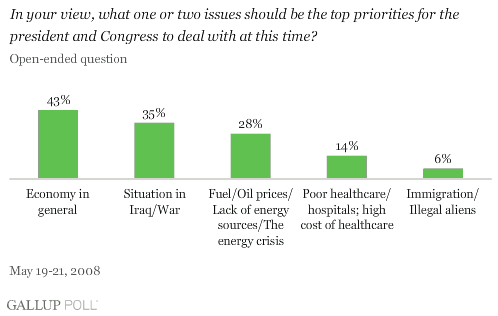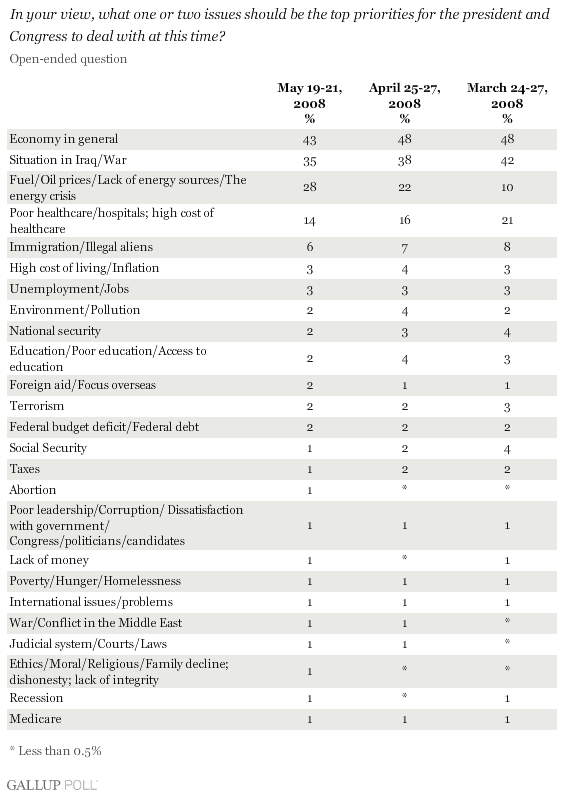PRINCETON, NJ -- The latest ÆéûÜǨû§Panel survey finds three issues -- the economy, the war in Iraq, and gas prices -- far and away rate as the public's top priorities for the president and Congress to deal with at this time.

In the May 19-21 survey, 43% of Americans mention the economy, 35% the war in Iraq, and 28% gas prices or energy as the No. 1 government priority. Mentions of gas prices are up slightly from last month (22%) and are substantially higher than in March (10%).
Meanwhile, fewer mention the economy in general terms than did so in April (48%), but a significant number of respondents cite more specific aspects of the economy, including inflation, unemployment, recession, and taxes, as well as gas prices. All told, 67% of Americans mention some economic issue, which is the same percentage who did so in April.
The next-most-frequently mentioned issues after the "big three" are healthcare (14%) and immigration (6%). No other issue is mentioned by more than 3% of respondents.

Rank-ordering of the top three issues varies by party affiliation. A majority of Democrats mention the economy as the government's top priority (51%), putting it slightly ahead of the Iraq war (44%) and well ahead of gas prices (21%).
In contrast, gas prices rank as the most commonly mentioned issue among Republicans at 37%, compared with 32% who mention the economy and 27% who cite the Iraq war.
The rank ordering of political independents is similar to that of Democrats, though there is a larger gap between the No. 1 issue of the economy (46%) and the No. 2 issue of the war (31%). Twenty-four percent of independents believe gas prices and energy should be the top priority for the federal government.
Implications
While Americans' priorities for their elected representatives are fairly clear, the question is how government will respond. The president and Congress have already passed an economic stimulus package to help boost the economy, and are considering additional measures. Congress recently passed measures to address the energy situation, including halting future deposits in the government's Strategic Petroleum Reserve, though it is unclear that any government action could provide immediate relief on gas prices. The Bush administration continues to set the course on policy in Iraq, largely on the advice of Gen. David Petraeus, while congressional Democrats have unsuccessfully tried to push for a quicker end to the war.
Survey Methods
Results for this ÆéûÜǨû§Panel study are based on telephone interviews with 1,013 national adults, aged 18 and older, conducted May 19-21, 2008. ÆéûÜǨû§Panel members are recruited through random selection methods. The panel is weighted so that it is demographically representative of the U.S. adult population. For results based on this sample, one can say with 95% confidence that the maximum margin of sampling error is ôÝ4 percentage points.
For results based on the sample of 523 Democrats and Democratic leaners, the maximum margin of sampling error is ôÝ4 percentage points.
For results based on the sample of 438 Republicans and Republican leaners, the maximum margin of sampling error is ôÝ4 percentage points.
In addition to sampling error, question wording and practical difficulties in conducting surveys can introduce error or bias into the findings of public opinion polls.
To provide feedback or suggestions about how to improve Gallup.com, please e-mail feedback@gallup.com.
